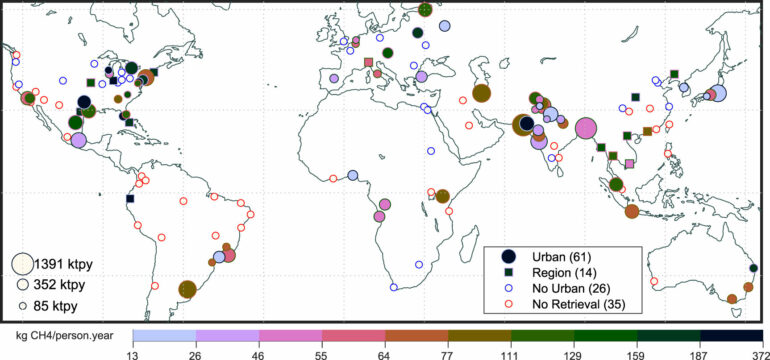Research published in Environmental Research Letters has shown that methane emissions from urban areas are underestimated by a factor of three to four and that untreated wastewater may be a contributing factor.
The study, “Investigating high methane emissions from urban areas detected by TROPOMI and their association with untreated wastewater,” was led by Benjamin de Foy, Ph.D., professor of Earth and Atmospheric Sciences at Saint Louis University.
The researchers found that methane emissions from the discharge of untreated wastewater are a major contributor to global methane emissions and that improving wastewater treatment in urban areas could lead to a significant reduction in greenhouse gas emissions, helping cities on a quest for carbon neutrality.
“We estimate that reducing discharges of untreated wastewater could reduce global methane emissions by up to 5 to 10%,” said de Foy. “This could also yield significant ecological and human benefits.”
The two largest contributors to climate change are carbon dioxide and methane. In 2021, global methane concentrations increased at the highest rates on record and current estimates of methane emissions inventory cannot explain recent trends.
One method of evaluating methane emission is via satellite remote sensing, for example, with the TROPOspheric Monitoring Instrument (TROPOMI) on board the Sentinel 5 Precursor satellite. This has been measuring methane and other air pollutants all around the world since November 2017.
The research shows that methane emissions from urban areas may be underestimated by a factor of 3 to 4 in the Emissions Database for Global Atmospheric Research (EDGAR) greenhouse gas emission inventory. The study scaled the results to 385 urban areas worldwide with more than 2 million inhabitants each, suggesting that they could account for up to 22% of global methane emissions.
The emission estimates of the 61 urban areas do not correlate with the total or sectoral EDGAR emission inventory. They do however correlate with estimated rates of untreated wastewater, varying from 33 kg of methane per person per year for cities with zero untreated wastewater to 138 kg of methane per person per year for the cities with the most untreated wastewater.
The study looked at different scenarios for reducing emissions in the 61 urban areas, as well as for all areas with a population of more than 2 million. By reducing the emissions of the 33 cities with medium to high levels of untreated wastewater to the mean emissions of cities with zero to low untreated wastewater emissions, 2% of the worldwide emissions total could be cut. If all 61 cities reduced their emissions to the lowest rate, that would cut 6% of total worldwide methane emissions.
The researchers’ model points to untreated wastewater rather than other options, including natural gas leaks or older infrastructure, as a large share of overall methane emissions.
“Our estimates of methane emissions suggest that there is methane formation in the environment as a result of the release of untreated wastewater which is much larger than the estimates in current inventories,” said de Foy. “Some urban areas could reduce their emissions 50% or more by fully treating all their wastewater.”
The researchers say more work is needed to bridge the gap between inventories and measurements to create a more refined global emission inventory and identify more precisely the varying emissions from city to city. For example, cities in Europe and China emit much less methane than those in North America and Asia.
De Foy said that there can be large differences within countries, noting Milwaukee has a large methane enhancement but neighboring Minneapolis does not, which could be due to differences in how stormwater and sewage are handled.
One hundred fifty countries have committed to reducing their methane emissions by 30% by 2030 relative to 2020 as part of the Global Methane Pledge. Improved wastewater treatment could make a significant contribution to this goal.
More information:
Benjamin de Foy et al, Investigating high methane emissions from urban areas detected by TROPOMI and their association with untreated wastewater, Environmental Research Letters (2023). DOI: 10.1088/1748-9326/acc118
Provided by
Saint Louis University
Citation:
Research finds improved wastewater treatment could lead to significant reduction in greenhouse gas emissions (2023, March 23)



